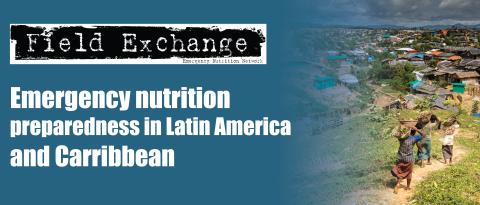Guidance for nutrition in emergencies practitioners on COVID-19
The Global Technical Assistance Mechanism for Nutrition (GTAM) has released a technical brief for Nutrition in Emergencies (NiE) practitioners on COVID-19,1 in response to requests from country-level teams. The brief provides an overview of available guidance and tools to inform the integration of COVID-19 preparedness and response into humanitarian nutrition responses. Guidance and capacity-building resources are listed with online links in the following areas: preparedness; health and nutrition facility and systems management; management of wasting; nutritional support for patients with COVD-19; infant and young child feeding; workplace precautions and research.
Key considerations for emergency settings are summarised where applicable guidance is currently available. The brief emphasises the need for preparedness actions to ensure comprehensive medical, nutritional and psychosocial care for those with COVD-19. In terms of health systems management, The World Health Organization (WHO) recommends that facilities and nutrition centres apply standard precautions (such as respiratory and hand hygiene measures) for all patients and additional precautions (contact, droplet and airborne) for suspected COVD-19 cases. Administrative controls and policies are also recommended for the prevention and control of transmission of the virus and recommendations are made on the rational use of personal protective equipment in light of expected global supply chain disruptions.
In terms of the management of wasting, it is recognised that, during an influenza pandemic, levels of malnutrition may increase. To prevent malnutrition, key family practices and treatment of common illness should be encouraged and the health and food security sectors closely linked. Programmes may need to be adjusted (for example, to avoid mass gatherings and decrease frequency of follow-up visits at health facilities). Existing community-based management of acute malnutrition (CMAM) programmes should continue if possible, but new CMAM programmes are not recommended during an influenza pandemic. Supplementary feeding programmes should continue if possible, as should inpatient therapeutic feeding programmes, with separate isolation areas for patients with suspected influenza.
There is currently no guidance for the nutritional support of COVID-19 patients. However, Centers for Disease Control (CDC), United Nations Children’s Fund (UNICEF), WHO and other agencies have issued clear statements about COVID-19 and breastfeeding. Based on the known benefits of breastfeeding and limited evidence that the COVID-19 virus is not present in breastmilk, continuation of breastfeeding is advised, regardless of COVID-19 status. The main risk of transmission between a caregiver and their child is through close contact (respiratory air droplets). For caregivers with suspected or confirmed COVID-19 infection, precautions to prevent transmission, such as frequent handwashing, are recommended when feeding infants and young children. Breastfeeding mothers should not be separated from their newborns, although breastfeeding mothers with suspected or confirmed COVID-19 infection can consider asking someone who is well to feed the infant; for example with expressed breastmilk from a spoon or cup. Breastfed children of patients who are too unwell to breastfeed or who have died may require replacement feeding with a nutritionally adequate diet; for example, donor human milk through wet nursing or with a breastmilk substitute. With regard to feeding children expressed breastmilk, as per the Operational Guidance on Infant and Young Child Feeding in Emergencies (OG-IFE),2 the use of breast pumps should only be considered when their use is vital and where it is possible to clean them adequately, such as in clinical settings. The use of feeding bottles and teats is discouraged due to high risk of contamination and difficulty in cleaning. The use of cups without spouts should be supported from birth. General guidance on IYCF in the context of infectious disease outbreaks can be found in the OG-IFE.
Given the rapidly evolving situation, this brief will be updated every two weeks until further notice. Visit the GNC website to view the latest version at http://nutritioncluster.net


